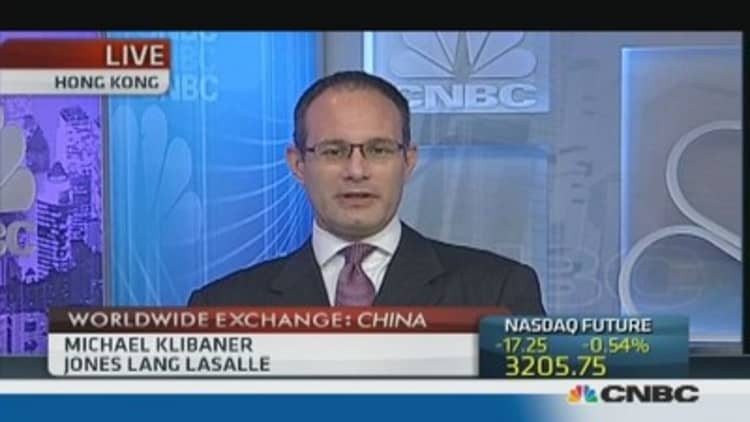
Detailed plans for the Shanghai Free Trade Zone (FTZ) have fueled hopes for further reforms and liberalization in China but some analysts think it's too early to celebrate.
"We think the importance of the Shanghai FTZ will surely surpass any other existing special zones," Ting Lu, China economist at Merrill Lynch, said in a note.
"However, we believe markets need to curb their enthusiasm if they hope the FTZ will become a strong competitor of Hong Kong... [or will] rapidly unveil a new era of comprehensive reforms for the whole China," added Lu.
(Read More: Shanghai's free trade zone - What's the hype about?)
Plans unveiled over the weekend confirmed that restrictions for foreign investment in the tightly-controlled service industry will be eased, while the domestic currency will potentially be opened up to market forces within the new 28.8-square kilometer district.
Furthermore, state officials said the zone will be viewed as a testing ground for reforms that could eventually be rolled out across China, a sign that the world's largest economy could be moving towards relaxing restrictions on foreign investment.
But according to Lu, although many investors hope the FTZ could rival the success of Hong Kong, where many Chinese companies go to raise global funds and which has thrived as an offshore center for the renminbi, he doubted this would be the case.
(Read More:Global banks cautious on Shanghai free-trade zone)
"There will be no special tax treatments in the FTZ, while Hong Kong's 16 percent personal income tax will continue to retain talent and headquarters of global banks," said Lu.
"Secondly, though the central government vowed to build a business environment with rule of law and international standards, the very requirement of 'replicability' might hinder bold legal and administrative reforms, which are crucial for building a center for finance and commerce," he added.

Lu also cast doubt over whether the new trade zone would likely form a blueprint for reforms to be rolled out across China.
(Read More: Is Shanghai's free trade zone really a game changer?)
"Unfortunately many much needed reforms in China, such as reforms on state-owned enterprises, public finance, land ownership and the Hukou system (a household registration system that links benefits like health care, education and pensions to a person's place of birth and discourages migration) won't be in the spotlight in the small 28.8 square km Shanghai FTZ," said Lu.
"Shanghai is too unique to test many of China's necessary reforms, and the FTZ is just too small to have the capacity to test those reforms," he added.
However, other industry commentators were more convinced that the new zone would lead to widespread reform in China.
(Read More: China Can Reform Without Any 'Wrist Cutting')
"The official launch of the Shanghai pilot free trade zone will likely trigger a new wave of reforms and liberalization in the coming years. This is comparable to the Special Economic Zone in the early 1980s and the Pudong Development Zone in the early 90s," said HSBC analysts in a note.
In the early 1980s China opened a series of special economic zones to test economic policies and government measures. Pudong, another Special Economic Zone, is currently home to the Shanghai Stock Exchange as well as some of Shanghai's most iconic buildings.
"We expect concrete measures of services sector deregulation and financial reforms to be unveiled in the coming months. This will have profound implications for China's long-term growth outlook and financial landscape," they added.
— By CNBC's Katie Holliday: Follow her on Twitter @hollidaykatie


